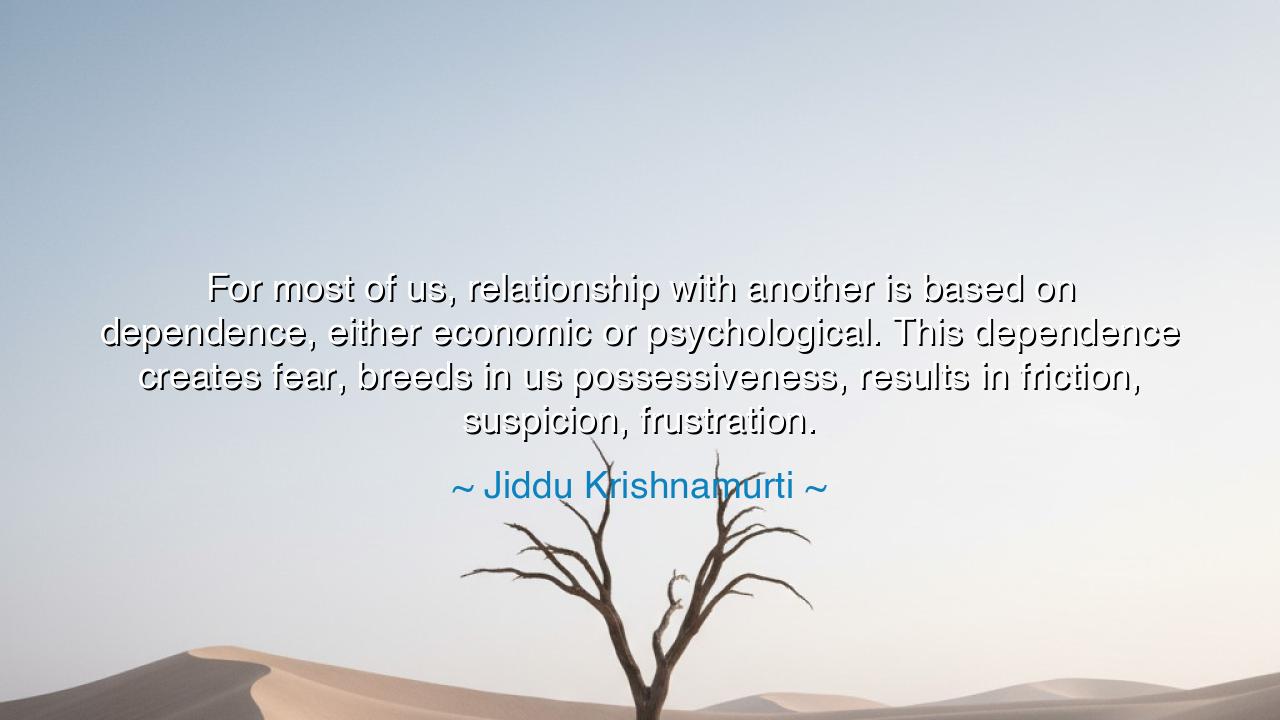
For most of us, relationship with another is based on
For most of us, relationship with another is based on dependence, either economic or psychological. This dependence creates fear, breeds in us possessiveness, results in friction, suspicion, frustration.






The sage Jiddu Krishnamurti, seeker of truth beyond all illusions, once declared: “For most of us, relationship with another is based on dependence, either economic or psychological. This dependence creates fear, breeds in us possessiveness, results in friction, suspicion, frustration.” In these words he unveils the hidden chains that bind the human heart, showing that what we often call relationship is not born of freedom, but of need. Where there is dependence, love is overshadowed, and bondage takes the place of true union.
Consider the weight of economic dependence, where one clings to another not out of joy, but for sustenance and survival. Such ties are fragile, for they rest upon necessity, not upon the blossoming of affection. Likewise, psychological dependence, born of loneliness and inner emptiness, demands from the other a constant supply of comfort. In both cases, the spirit is not free to love, but only to grasp, to cling, to hold tightly in fear of loss.
From such dependence arises fear, that silent poison which eats at the roots of companionship. Fear whispers, “What if they leave? What if I am abandoned?” And thus it gives birth to possessiveness, the desire to bind the other as property, to control, to cage what cannot be caged. Yet no soul thrives in captivity, and so the bond turns bitter, producing friction, suspicion, and frustration.
Krishnamurti, like the teachers of old, points us toward liberation. True relationship is not founded upon lack, but upon wholeness. It is when two spirits, each complete in themselves, walk together without chains, without fear, that love shines in its purity. Only then is there harmony, for neither demands, neither clings, neither seeks to possess.
So let this wisdom be carried forward: that love cannot grow where dependence rules. Seek first to free the self from emptiness, and then to meet the other not as a crutch, but as a companion. For where there is freedom, there is no fear, and where there is no fear, there blossoms the true flower of relationship.






THTran Thi Thu Hien
Jiddu Krishnamurti’s words really highlight how much our emotions are tied to dependence. I’ve often felt that relationships thrive on mutual support, but if that support turns into dependence, can it truly remain healthy? How do we build relationships that are free of the fear and possessiveness he describes? Can we learn to love without letting dependence limit the potential for trust and freedom in our partnerships?
VATrinh Van Anh
This quote touches on an uncomfortable reality in many relationships: that dependence can breed fear, suspicion, and frustration. But how do we redefine what a healthy relationship looks like in this context? Can we find a balance between interdependence and independence? How do we move beyond the fear-based dynamics and truly connect without letting these negative emotions take over?
VQVo Quynh
Jiddu Krishnamurti’s insight speaks to the deeper, sometimes unspoken truths of human relationships. Dependence creates tension, and that makes me think—can we really love someone without relying on them in some way? How much dependence is healthy, and when does it cross into unhealthy territory? Can we learn to be independent while still fostering close emotional connections, or do they always need to be intertwined?
HLTran Nhu Hoang Linh
I find this perspective both thought-provoking and unsettling. It makes me wonder, are all relationships doomed to experience fear and frustration due to dependence, or can we break free from that cycle? Is it even realistic to expect a relationship to be completely free of possessiveness or suspicion? What would a truly independent, yet intimate, relationship look like, and is it possible to achieve?
GDGold D.dragon
This quote by Jiddu Krishnamurti really challenges the traditional view of relationships. It suggests that dependence, whether economic or psychological, can create negative emotions like fear and possessiveness. But is it possible to have a healthy relationship without any form of dependence? Can true connection exist without these dynamics, or are they an inevitable part of human bonding? How do we navigate this delicate balance in relationships?